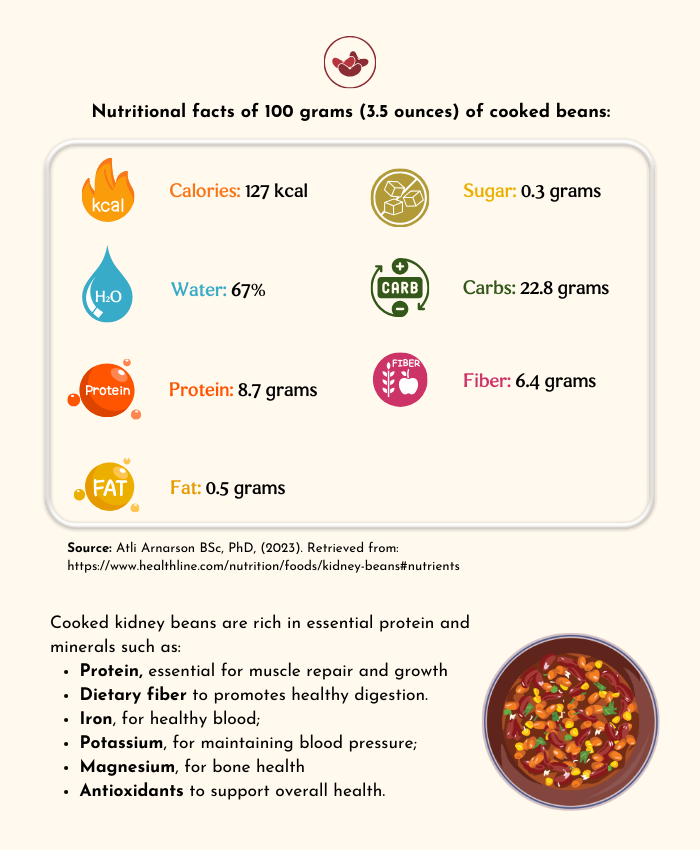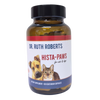When it comes to enriching our pets' diets with variety and nutrition, many pet owners explore the possibility of incorporating various human foods, including legumes like kidney beans. However, the question of whether kidney beans are safe and beneficial for our furry friends often arises. In this article, we'll delve into the suitability of kidney beans for dogs and cats, ensuring you're equipped with the knowledge to make informed decisions about your pets' diets.
The Nutritional Benefit of Kidney Beans
Kidney beans are a nutritious addition to any diet, offering a rich source of plant-based protein, essential vitamins, minerals, and dietary fiber. They are particularly high in folate, iron, and potassium, supporting heart health, blood cell formation, and overall well-being. Additionally, their high fiber content aids in digestion and can help manage weight by promoting a feeling of fullness.
In Traditional Chinese Medicine (TCM) [1], kidney beans are valued for strengthening the kidneys, being blood tonics due to their color and shape, and for their properties in removing dampness and phlegm, which includes both physical and mental manifestations. Similarly, in Ayurveda, they're seen as nutritious and balancing, promoting digestive health, energy, and overall nourishment.
Cooked kidney beans offer enhanced nutritional benefits, as cooking increases their digestibility and bioavailability of nutrients. For every 100 grams (3.5 ounces) of cooked beans, they provide:

Can Cats and Dogs Eat Kidney Beans?
Given their healthy nutritional profile, can our cats and dogs eat kidney beans? Yes! Both cats and dogs can eat kidney beans in moderation, provided they are cooked properly to neutralize harmful substances like lectins. And it's essential to remember that they should not make up a significant portion of their diet. Dogs and cats have different nutritional requirements than humans.
KIDNEY BEANS FOR DOGS
Dogs are known to have a more omnivorous diet compared to cats, who are obligate carnivores. This means that dogs can generally tolerate a wider variety of foods, including plant-based ones like kidney beans, as they have evolved to digest and derive nutrients from both animal and plant sources. However, even though dogs may have a greater tolerance for plant-based foods, kidney beans should still be given to them in moderation.
- Moderation is Key: While kidney beans are packed with nutrients beneficial for dogs, they should only be a small part of their diet to prevent digestive issues and ensure they receive a balanced nutrition.
- Proper Preparation: Raw kidney beans contain lectins, which can be harmful. Always cook kidney beans thoroughly to neutralize these compounds before offering them to your dog.
- Avoid Seasonings: When preparing kidney beans for dogs, avoid adding any salt, spices, or garlic, as these can be harmful to their health.
KIDNEY BEANS FOR CATS
On the other hand, cats have a more specialized dietary requirement for animal-based protein since they are obligate carnivores. Cats primarily need nutrients such as taurine, which are crucial for their health. Feeding cats a diet primarily consisting of plant-based foods like kidney beans can indeed lead to nutritional deficiencies and health issues over time.
However, your cat still can eat kidney beans in small amounts and sparingly, or in rotation. Despite their obligate carnivore status, cats also need a balanced diet that includes some amount of carbohydrate. Kidney beans, being a source of complex carbohydrates, can provide valuable energy and fiber, which can support their gut health.
- In Small Amounts: Cats can consume kidney beans in small, infrequent amounts. This can provide them with additional fiber and nutrients without compromising their need for animal-based proteins.
- Thorough Cooking: Like with dogs, ensure any kidney beans fed to cats are well-cooked to eliminate harmful lectins.
How to Cook Dried or Raw Kidney Beans for Your Pet?
To safely include kidney beans in your pets' diets, follow these preparation tips:
- Soak and Rinse: Soak dried kidney beans in water for at least 5 hours or overnight, then rinse thoroughly. This process helps to remove some of the lectins and makes the beans easier to digest.
- Cook Thoroughly: Boil the beans for at least 30 minutes to ensure all lectins are neutralized. Slow cooking can further enhance their digestibility and reduce any remaining toxins.
- Serve Plain: Offer the cooked beans to your pet without any added seasonings or ingredients that could be harmful to them.

Substitutions for Kidney Beans
While kidney beans offer versatility in various dishes, they might not be suitable for everyone due to lectins, FODMAP sensitivity, or other dietary restrictions. There are many reports that kidney beans have caused gut problems when consumed. One reason for this is that kidney beans are not low FODMAP foods. FODMAPs (Fermentable Oligosaccharides, Disaccharides, Monosaccharides, and Polyols) are a group of short-chain carbohydrates that are poorly absorbed in the small intestine and can cause digestive discomfort in some individuals, particularly those with irritable bowel syndrome (IBS) or other gastrointestinal issues. Kidney beans are considered to be high in FODMAPs, specifically oligosaccharides, which can ferment in the gut and lead to symptoms such as bloating, gas, and abdominal discomfort in sensitive individuals.
When looking for kidney bean alternatives for pets, particularly dogs and cats, it's essential to choose options that are safe and healthy for their specific dietary needs. Here are some pet-safe alternatives:
- Black Beans: Similar in texture and rich in protein and fiber, black beans are a safe and nutritious option for pets when cooked plainly and served in moderation.
- Pinto Beans: These beans provide a similar nutritional profile to kidney beans, with protein and fiber content that supports digestive health. Ensure they are well-cooked and unseasoned.
- Chickpeas (Garbanzo Beans): Offering protein and fiber, chickpeas are a good alternative with a nutty flavor that pets might enjoy. They should also be cooked without any spices or salt.
- Green Beans: Low in calories and high in fiber, green beans can be a crunchy, nutritious snack for pets, offering a different texture and taste but with health benefits.
- Peas: Peas are a safe option for pets, providing protein, vitamins, and minerals. They're especially good for adding variety to a pet's diet and are often found in commercial pet foods.
- Lentils: With a similar nutritional profile to kidney beans, lentils offer protein and fiber. They should be cooked thoroughly and served plain to pets.
Conclusion
Kidney beans can be a nutritious addition to your pets' diets when prepared correctly and served in moderation. They offer a good source of protein, fiber, and essential nutrients that can complement the dietary needs of both dogs and cats.
However, their consumption should be approached cautiously for pets due to lectin content and potential digestive issues. Alternative substitutes like black beans, lentils, and chickpeas provide similar nutritional value. When considering homemade food, it’s essential to evaluate the pros and cons of raw versus cooked ingredients. Learn more in Raw Vs Homemade Dog Food: Health Benefits and Risk.
Proper preparation methods, such as soaking and slow cooking, can reduce lectin content and enhance safety. Utilizing a crockpot or slow cooker simplifies the process and improves flavor and texture. Careful consideration and consultation with a veterinarian or a holistic pet health coach are essential before including kidney beans or any legumes in pets' diets, ensuring the well-being of both humans and pets.
References
[1] Chinese Nutrition Society. (2017). Kidney bean in TCM. Retrieved from http://chinesenutrition.org/view_image.asp?pid=476
[2] Arnarson, A. (2023). Nutritional analysis of cooked beans. In Kidney Beans 101: Nutrition Facts and Health Benefits. Retrieved from https://www.healthline.com/nutrition/foods/kidney-beans#nutrients
















